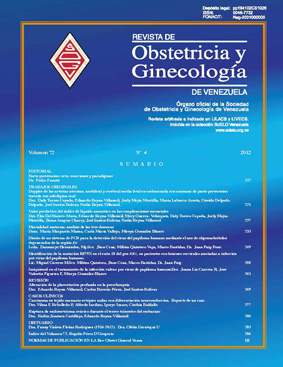Disfunción tiroidea: despistaje durante la gestación
Palabras clave:
Patología Tiroidea y Embarazo, Hipertiroidismo, Hipotiroidismo, Pathology Thyroid and Pregnancy, Hypothyroidism, HyperthyroidismResumen
Evaluar las alteraciones de la función tiroidea durante la gestación. Métodos: Estudio prospectivo, descriptivo, de corte transversal. Se incluyó una muestra probabilística de 137mujeres con gestación simple intrauterina en cualquier trimestre de la gestación, que acudieron a control en el Servicio de Prenatal de la Maternidad Concepción Palacios en el período abril - julio 2016. Se determinó, mediante la realización de la hormona estimulante de la tiroides y la tiroxina libre, la presencia de disfunción tiroidea en las gestantes. Resultados: Se diagnosticaron 10 casos de gestantes con disfunción tiroidea, lo que representa el 7,4 %. De ellos, la totalidad presentó hipotiroidismo subclínico. Tres casos (30 %) fueron diagnosticados en el primer trimestre, 3 casos (30 %) en el segundo y 4 (40 %) en el tercero. No hubo ningún factor de riesgo ni signo clínico asociado en forma significativa al diagnóstico. Conclusiones: El despistaje de disfunción tiroidea durante la gestación es útil y permitió detectar 7,4 % de casosde hipotiroidismo subclínico, los cuales se distribuyeron uniformemente en los tres trimestres de la gestación.
Evaluate the thyroid function alterations during gestation. Methods: Prospective, descriptive, and cross section study. It was included a probabilistic sample of 137 simple intrauterine pregnant women, during any trimester of gestation, that attended the Prenatal Service of the Maternidad Concepcion Palacios hospital, in the period between April 2016 and July 2016. It was determined the presence of thyroid dysfunction in expectant mothers, through the thyroid stimulating hormone test. Results: There was diagnosed 10 expectant mothers with thyroid dysfunction, that represent the 7.4 %, all of themwith subclinical hypothyroidism. Three cases (30%) were diagnosed during the first gestational trimester; three cases (30%) were diagnosed during the second gestational trimester; and four cases (40%) during third gestation altrimester. There was not any risk factor or clinical sign significantly associated with the diagnostic. Conclusions: The thyroid dysfunction screening is useful during the gestational period, and it allowed detect the7.4 % of the sub clinical hypothyroidism cases, which were evenly distributed in the three trimesters of gestation.

